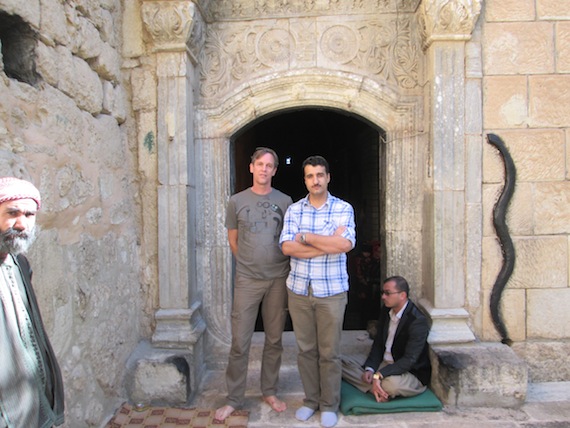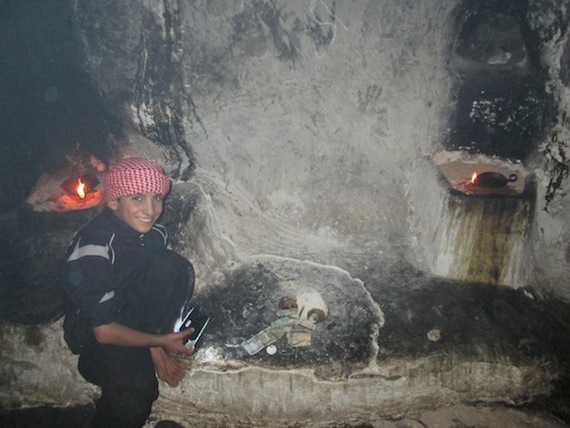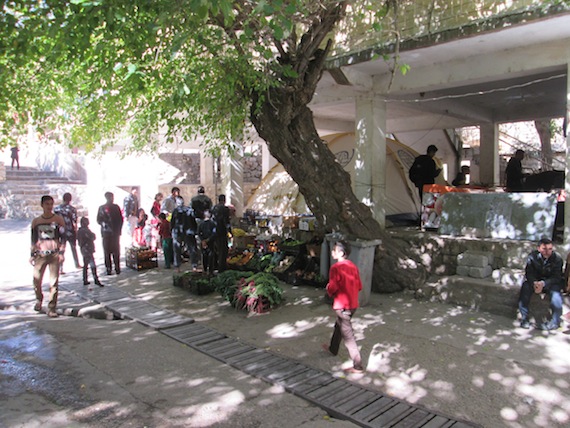By Richard Foltz | (Special to Informed Comment) —
Among the many victims of the barbarous Daesh (what Arabs call ISIS or ISIL), none has suffered more severely than the Kurdish Yezidis. After overrunning a number of Yezidi villages in Northern Syria and Iraq during the summer of 2014, Daesh extremists – who consider Yezidis to be “devil-worshippers” – systematically executed Yezidi men, while taking thousands of Yezidi women and girls as sex slaves. Thousands more Yezidis who were fortunate enough to escape the Daesh onslaught became refugees in Iraqi Kurdistan or Turkey, or even worse, remained trapped up in the Shingal (Shinjar) mountains of northeastern Syria after their villages below were seized by Daesh. In recent days the Kurdish Peshmarga militia have succeeded in breaking the Daesh siege of Shingal and opening a corridor to the refugees there, but with winter now upon them Yezidi refugees face additional hardships and challenges to their very survival. The Kurdistan Regional Government is doing what they can to supply food, blankets, and winter coat, but much more is needed.
For the Yezidis, Daesh are merely the latest in a long history of Muslim persecutors that have waged campaigns aiming to bring about their extinction. Yezidis speak of “the genocides” (they count 72 over the centuries) as watershed events marking their collective history. And while Daesh have shown themselves to be hostile to Christians, Jews, Shi‘ites, and indeed other Sunnis who don’t share their extreme views, they have reserved a special hatred for the Yezidis, a non-proselytizing sect who seek nothing more than to live at peace with their neighbours. What is it about the Yezidis that has made them such a target?
Until the events of last summer few people in the world had ever heard of the Yezidis, and experts on them are few and far between. The news media, hard put to provide reliable information on this little-known community, has typically characterized them as “members of a four-thousand-year-old sect, blending Zoroastrianism, Judaism, and Christianity”. Virtually every aspect of this description is inaccurate and misleading.
The Yezidi religion began to assume its present form during the twelfth century, under the inspiration and guidance of a Lebanese Sunni Sufi master by the name of Shaykh Adi ibn Musafir al-Umawi (d. 1162). Shaykh Adi, like many Sufi missionaries, made an attempt to accommodate the ancient folk beliefs and rituals of the local Kurdish population by nominally Islamicizing them. The Muslim authorities of the time, however, saw this “re-branding” as superficial, and took to persecuting the Yezidis as apostates.
The Kurds speak an Indo-European language close to Persian. Much of their pre-Islamic culture is Iranian, and as such, their myths and rituals contain many parallels to those found in Zoroastrianism. However, despite the efforts of some modern Kurdish intellectuals to equate the two religions, they are in fact rival versions of ancient Iranian religion. Classical Zoroastrianism is a dualistic religion with an extensive body of texts to support it, whereas Yezidism is an oral tradition that is essentially monotheistic. The ethical division between good and evil is starkly drawn in Zoroastrianism, but ambiguous among the Yezidis, who consider them as necessary complements to each other.
The respect accorded by the Yezidis to Iblis, or Satan, which mirrors that found in Sufi Islam, has led them to be falsely characterized as “devil-worshippers”. In fact the focus of their worship is the sun, which they greet upon rising each day. The Yezidis believe in a Divine Heptad, called by them the Seven Mysteries. The most important aspect if this haptad is Malak Tavus, the Peacock Angel, who is frequently depicted in their religious art. The most holy Yezidi site is the shrine of Shaykh Adi at Lalish, a small valley close to the city of Duhok in the northern part of Iraqi Kurdistan which is now overcrowded with refugees living in tents.
Despite the hardships currently faced by thousands of Yezidi refugees in the mountains of Shingal, Lalish and elsewhere, their spirit remains undiminished by the tragedies they have experienced. Vian Dakhil, the sole Yezidi member of the Iraqi parliament, was in Washington recently lobbying for recognition of IS’ attacks on the Yezidis as genocide, but her efforts have received little media attention.
Thanks to the diligence of the Peshmarga and YPG forces, supported by coalition airstrikes, the tide now seems to be turning against Daesh at least in northern Iraq, but it will be some time before tens of thousands of displaced Yezidis can return home and resume normal lives. For now, their story continues to unfold as another chapter in their collective history of surviving genocide.
Richard Foltz is Professor of Religion and Director of the Centre for Iranian Studies at Concordia University, Montréal. A chapter of his most recent book, Religions of Iran: From Prehistory to the Present (London: Oneworld, 2013), discusses the Yezidi faith in the historical context of ancient Iranian religion.






 © 2026 All Rights Reserved
© 2026 All Rights Reserved